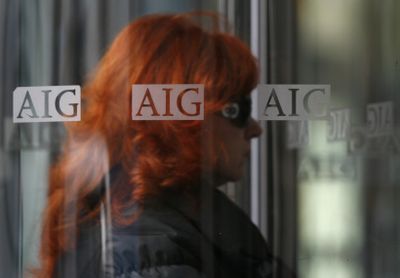Obama blasts AIG’s ‘greed’ in paying executive bonuses
President says he’ll try to block payments

WASHINGTON – Joining a wave of public anger, President Barack Obama blistered insurance giant American International Group for “recklessness and greed” Monday and pledged to try to block it from handing its executives $165 million in bonuses after taking billions in federal bailout money.
“How do they justify this outrage to the taxpayers who are keeping the company afloat?” Obama asked. “This isn’t just a matter of dollars and cents. It’s about our fundamental values.”
The bonuses could contribute to a backlash against Washington that would make it tougher for Obama to ask Congress for more bailout help – and jeopardize other parts of the recovery agenda that is dominating the start of his presidency. Thus, the president and his top aides were working hard to distance themselves from the insurer’s conduct, to contain possible political damage and to try to bolster public confidence in his administration’s handling of the broader economic rescue effort.
David Axelrod, senior adviser to Obama, said in an interview with the Associated Press that there was no question that the bonuses and the public’s anger over them could run many things off the rail.
“People are angry because they’ve seen exhibit after exhibit of irresponsibility and people walking away with money in their pockets,” he said. “It’s undermined the discussion that we have to have.”
Obama had scheduled a speech Monday to announce new help for recession-pounded small businesses. But first, he said, he had a few words to say about AIG. He lost his voice at one point and ad-libbed, “Excuse me, I’m choked up with anger here.” It was just a light aside, but he meant the sternness of his remarks to come through.
“This is a corporation that finds itself in financial distress due to recklessness and greed,” Obama declared.
He said he had directed Treasury Secretary Timothy Geithner to “pursue every legal avenue to block these bonuses and make the American taxpayer whole.”
Later, White House spokesman Robert Gibbs said the administration would modify the terms of a pending $30 billion bailout installment for AIG to at least recoup the $165 million the bonuses represent. That wouldn’t rescind the bonuses, just require AIG to account for them differently.
Axelrod called the bonuses “spectacularly tone-deaf.”
He said the administration hoped the tough talk would result in voluntary action on the part of AIG and its bonus recipients, although that remains an open question. “All we can do is administer this thing going forward,” he said.
One reason that the AIG bonus giveaway is such a compelling story is that it offers a simple story line that appears to sum up ways in which the federal bailouts have gone awry.
“This is just the kind of issue that galvanizes public outrage,” said Paul C. Light, professor of public service at New York University. “It’s always the tangible stuff, the things that ordinary Americans can relate to.”
Bailout steps for AIG totaling over $170 billion since September have effectively left the federal government with an 80 percent stake in the faltering insurance giant.
Obama’s sharp words continued an insistent administration drumbeat over the past few days designed to pressure the bonus recipients to forgo them. Thus far, American International Group officials have refused to rescind the payments.
In a letter to Geithner over the weekend, the government-appointed chief executive of AIG, Edward Liddy, said the bonuses were legally binding obligations and the firm’s “hands are tied.”
Still, pressure was building on that issue – and on the government to rework its AIG bailout to make sure the company repays as much of the $170 billion as possible.
So far, the company has been honoring its contracts with U.S. and foreign banks, paying out more than $90 billion in economic bailout funds to big banks and others. The government agreed to uphold those contracts when it seized control of AIG in September, contending that failure would bring even worse global economic problems.